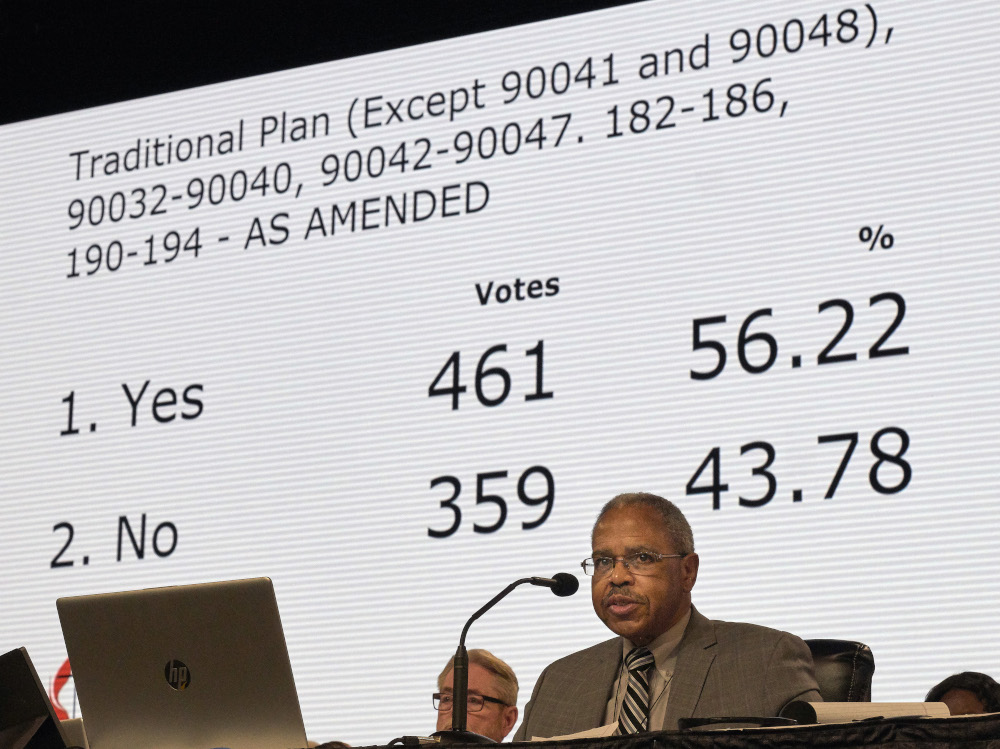
As the Rev. Joe Harris presides, the results of a vote about the so-called Traditional Plan are displayed during a legislative session of the special session of the General Conference of the United Methodist Church, held in St. Louis on Feb. 25, 2019. The plan would strengthen denominational penalties for LGBTQI clergy and for clergy who perform same-sex weddings. Photo by Paul Jeffrey for United Methodist News Service
In a surprise, the plan recommended by the United Methodist Church’s Council of Bishops was rejected Feb. 25 by the denomination’s decision-making body.
The so-called One Church Plan did not pass out of General Conference’s Legislative Committee to be considered by delegates Tuesday during the plenary session.
But that doesn’t mean the proposal is dead, according to supporters.
Reconciling Ministries Network, a movement advocating for the full inclusion of LGBTQ people in the church, tweeted after the vote that the rejected plan will "almost certainly still come up" as a minority report on Tuesday.
Neil Alexander — co-convener of Uniting Methodists, a group supporting the One Church Plan — confirmed a minority report including the plan has been filed in opposition to the Traditional Plan.
"We are deeply disappointed about the defeat of the OCP and seeking ways to respond to the deep hurt this action causes many LGBTQ people and all who love (them). And we are committed to find ways to make justice and mercy a centerpiece of all of our ministries," Alexander said in an email to Religion News Service. "We have much work to do."
The One Church Plan would allow individual churches and regional annual conferences to decide whether to ordain and marry LGBTQ members. It’s one of three plans presented this week to delegates at the special session of the General Conference dedicated to sexuality.
The Rev. Denise Honeycutt of the Virginia Annual Conference had encouraged delegates to support the plan because she said it allows for churches to hold differing beliefs and "together we are stronger."
"It does not make any of us choose things that are contrary to our own convictions, but it allows us together to be the body of Christ and joyful, passionate disciples of Jesus," Honeycutt said.
The delegate said she has pastored large and small churches. She has been a missionary to Nigeria and visited United Methodist churches around the world. She never has been in a church where everybody agreed on everything, she said.
"And yet we were able to be church — to love one another and stay together," she said.
Meantime, Rudolph Merab, a delegate from the Liberia Annual Conference, spoke against the One Church Plan.
"We keep talking about trying to be united, but, in fact, we continue to talk about being divided," Merab said. "It is better to be divided by truth than to be united in error."
Earlier in the day, the Legislative Committee, made up of the same 864 General Conference delegates who will vote on the plans during the plenary, approved for a vote another plan, the Traditional Plan.
The Traditional Plan would strengthen the enforcement of language in the denomination’s rulebook stating that "the practice of homosexuality is incompatible with Christian teaching" and that "self-avowed practicing homosexuals" cannot be ordained as ministers, appointed to serve or be married in the church.
Nearly 56 percent of delegates had ranked the Traditional Plan a high priority for the General Conference during the first day of deliberations.
Advertisement





